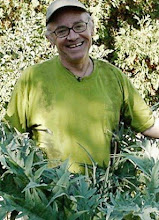 Exploration of the zinnia
Exploration of the zinnia





Most of the seed orders were made on Friday, with one going via USPS tomorrow. Territorial Seed Company had some tempting lettuce but spinach and some interesting peppers were the top choices. Johnny's Selected Seeds got the arugula picks but also the lettuces. The reason was simple - pellitized seed. Because transplants are an important process in my lettuces; pellitized seed makes for ease of planting. I am going with as many pellitized seeds as possible. This company also has carrot seed pellitized and basil too. I feel that the increased cost is negated at plating time because of the ease with which one can position seed into flats. This would be true even with direct seeding in the garden - think of no more thinning in the carrot row. I am sold on pellitized seed and would suggest you try some. Also a neat find was a seed trademarked as 'simply salad' from Stokes Seeds. They have multi-seeded mini pellets with multi-species salad mixes. I am going to try both the 'alfresco mixture' and the 'global gourmet' mix. Baker Creek Heirloom Seeds provided me with some of my zinnia choices . This Summer is 'The Year of the Zinnia', according to the National Garden Bureau - so we are ready with some selections of old time zinnias. Baker Creek also had a luffa gourd and a few tomatoes of interest. Pinetree Garden Seeds will supply the yellow tomato 'Nebraska wedding'. I have seen this variety labled as determinate and indeterminate so growing it will tell the tale. sand hill preservation center is the source for my cubits grafting seed.
I want to continue the experiment with tomato grafting but also want to try grafting some melons and cucumbers. The literature suggest using 'cucurbita ficiolia' and 'cucumis metuliferus' both of which Sand Hill has - great. plus I like the seed packet size of this supplier. They are a small company with a great catalog - no pictures so you will have to read their descriptions. They are also a catalog of rare poultry. So if you are going to experiment with chickens you might get their catalog. Chickens are a dream here but maybe not practical yet. One concern with Sand Hill is their 25 chick minimum order - way too many birds for a 4 hen ordinance here in Green Bay.
Besides the grafting I am using the summer green house space to grow our cucumber crop so I ordered varieties that will produce fruits without pollination. This is rather noteworthy because I want to work on learning more about native bees as pollinators. After the success of getting the ban on residential bee hives lifted here in Green Bay. knowledge of native bees which are just as efficient, maybe more so, than honey bees, would help in spreading the word about these species that could be encouraged in back yards maybe more easily and definitely cheaper than honey bee set-up. 'Farming for Bees' guidelines for providing native bee habitat on farms, from the Xerces Society for Invertebrate Conservation - ISBN 9780974447513, is a good introduction to this idea. Go to the society web page to read about pollinators and get publications.
Happy Gardening

Beekeeping (or apiculture) is the maintenance of bee colonies, commonly in man-made hives, by humans. Most such bees are honey bee garden in the genus Apis, but other honey-producing bees such as Melipona stingless bees are also kept.
ReplyDeleteThere are two types of kitchen gardening. The first type takes place in your kitchen and can involve either re-growing veggies from food scraps garden kitchen
ReplyDelete